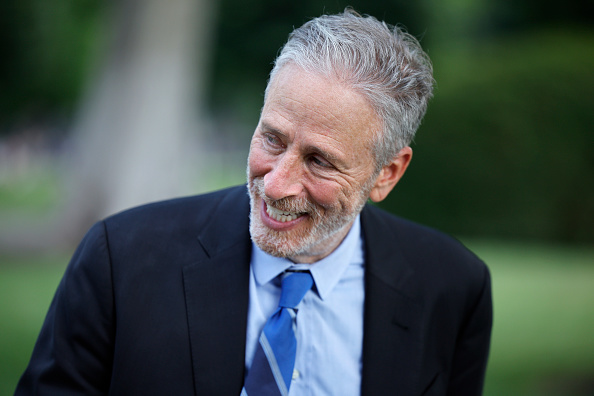

Jon Stewart Wasn't Wrong
By Dustin Rowles | TV | March 1, 2023 |
By Dustin Rowles | TV | March 1, 2023 |

I listen to every episode of Jon Stewart’s podcast, even the ones that I think won’t interest me, because invariably, they always do. He’s doing what he’s argued for years the media should do: He’s adding context and nuance to complicated issues. He will take a topic, he will bring in an expert or two, and they will cover it extensively. I did not care, for instance, about the Chinese spy balloon story. However, I learned so much about foreign relations and the intelligence community listening to that episode, but not as much as I did listening to the one about classified docs, which provided a really good example of something most of us did not understand because the only perspective we had about the classified doc situation was a political one. Trump is bad! Biden is bad! Oh, wait, is Pence bad, too?
We didn’t understand that — beyond the politics — the security classification system is deeply, deeply broken. There are millions and millions of classified documents — one is created every 8 seconds — and that there are 1.3 million people with security clearance in America. Most of those documents do not need to be classified. Most of those people with security clearance do not need it! Likewise, Stewart’s show brilliantly covered the Tyre Nichols situation because they not only get into systemic problems in policing but why those systemic problems exist in the first place (essentially because white people in nice neighborhoods have historically created police forces to protect them from people in poor neighborhoods).
The point is: The man still hates Fox News more than anyone — and rails against it constantly (last week’s podcast episode was devoted to his hatred of Fox News), but he and his team do a good job of ignoring the media’s politicization of issues and getting to the root of the problem. It’s rubbed off on me: I’m less interested, at least for the time being, in getting into the daily political spats between Trump and DeSantis, or Biden and Trump, and more interested in understanding the deeper context.
All of which is to say: I’ve been listening to Stewart’s podcast regularly for the last year, and sometimes, it feels like sneaking out behind the building to smoke a cigarette. I didn’t want anyone to know, because a number of progressives had thrown Stewart overboard when he went in on what we thought was a conspiracy theory regarding the lab leak. Democrats and Republicans had made up their minds about the origin of COVID-19, and I think both sides picked the evidence we wanted to support our position. (I was very hard on Stewart for this.)
Jon Stewart had the radical opinion that a novel coronavirus that originated in Wuhan came from a lab in Wuhan that studied novel coronaviruses. I don’t know why that sounded insane to us, but for some reason, we decided that was the Republican explanation, the racist explanation, although Hasan Minhaj on The Daily Show wondered yesterday why that was more racist than assuming that it originated in “a wet market where Chinese people eat weird animals.”
It is worth noting that the Department of Energy’s confidence in its assessment that it originated in a lab is low. It’s also worth noting that there is real disagreement among 9 intelligence agencies — five of which said it originated from natural causes, two from a lab leak, and two who don’t know. I think the combination of those assessments makes it pretty clear that no one knows with certainty, and none of us are likely to know.
It doesn’t mean that Jon Stewart was right, but it also means that he wasn’t necessarily wrong, not that Stewart is taking a victory lap or anything — as he says, this goes back to the same problem: Our inability — because of political polarization — to have a conversation about “things that are within the realm of possibility without falling into absolutes and litmus testing each other for our political allegiances.”
Today @JonStewart talks to some of our staff about the news that the COVID-19 virus may, in fact, have leaked from a lab in China and what it reveals about the problem with the media narrative machine. Full episode drops Wednesday on @ApplePodcasts pic.twitter.com/tsaLUYzIRl
— The Problem With Jon Stewart (@TheProblem) February 27, 2023
He wasn’t mad at the backlash, either. “They are doing what I was doing. The part that I don’t like about it is the absolutes and the dismissive, ‘Fuck you, I’m done with you. I will never forgive you. You have crossed an unforgivable line. You have expressed an opinion that is antithetical to mine, or not mine … what was stunning to me was the level of anger.”
And that’s where we are getting into trouble. We’re not considering the possibility that another opinion could be right if the person expressing it does not share our exact same political views, and we have a tendency — if we don’t agree with someone on one issue — to dismiss that person’s opinion on all other issues. We’re thinking politically instead of critically.
More Like This
The Experiment With Diversity Is Over in Late Night TV, Suggests Dulcé Sloan
Jordan Klepper Got A "Glimmer Of Hope" From A Trump Supporter
Leave Josh Peck Alone, Says Drake Bell in the Wake of 'Quiet on the Set' Revelations
The Problem with Peacock's 'Apples Never Fall' Is Its Infuriating Ending [Spoilers]
Jax Taylor and Brittany Cartwright on ‘The Valley’ Premiere: ‘The Drama Followed Us’

Jordan Klepper Got A "Glimmer Of Hope" From A Trump Supporter
Leave Josh Peck Alone, Says Drake Bell in the Wake of 'Quiet on the Set' Revelations
Sophie Turner Has ‘Reactivated’ Her Divorce From Joe Jonas
Is Aaron Taylor-Johnson The Next James Bond?
Sydney Sweeney Is All Business When It Comes to ‘Madame Web’: ‘That Film Was a Building Block’
Megan Fox Helpfully Lists All The Plastic Surgery She's Had
More Like This
The Experiment With Diversity Is Over in Late Night TV, Suggests Dulcé Sloan
Jordan Klepper Got A "Glimmer Of Hope" From A Trump Supporter
Leave Josh Peck Alone, Says Drake Bell in the Wake of 'Quiet on the Set' Revelations
The Problem with Peacock's 'Apples Never Fall' Is Its Infuriating Ending [Spoilers]
Jax Taylor and Brittany Cartwright on ‘The Valley’ Premiere: ‘The Drama Followed Us’
Reviews